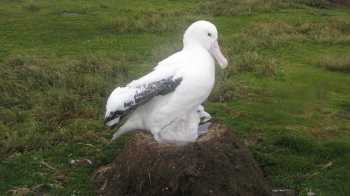Sabrina Tartu (Centre d'études biologiques de Chizé, Villiers-en-bois, France) and colleagues have published in the journal Environmental Pollution on polychlorinated biphenyl exposure and corticosterone levels in ACAP-listed Wandering Albatrosses Diomedea exulans and in Snow Pagodroma nivea and Cape or Pintado Daption capense Petrels.
The paper’s abstract follows:
“The role of polychlorinated biphenyls (PCBs) on exposure-related endocrine effects has been poorly investigated in wild birds. This is the case for stress hormones including corticosterone (CORT). Some studies have suggested that environmental exposure to PCBs and altered CORT secretion might be associated. Here we investigated the relationships between blood PCB concentrations and circulating CORT levels in seven free-ranging polar seabird species occupying different trophic positions, and hence covering a wide range of PCB exposure. Blood ∑7PCB concentrations (range: 61–115,632 ng/g lw) were positively associated to baseline or stress-induced CORT levels in three species and negatively associated to stress-induced CORT levels in one species. Global analysis suggests that in males, baseline CORT levels generally increase with increasing blood ∑7PCB concentrations, whereas stress-induced CORT levels decrease when reaching high blood ∑7PCB concentrations. This study suggests that the nature of the PCB-CORT relationships may depend on the level of PCB exposure.”

Wandering Albatross and chick, photograph by John Cooper
With thanks to Margaret Koopman for information.
Reference:
Tartu, S., Angelier, F., Bustnes, J.O., Moe, B., Hanssen, S.A., Herzke, D., Gabrielsen, G.W., Verboven, N., Verreault, J., Labadie, P., Budzinski, H., Wingfield, J.C. & Chastel. O. 2015. Polychlorinated biphenyl exposure and corticosterone levels in seven polar seabird species. Environmental Pollution 197:173-180.
John Cooper, ACAP Information Officer, 04 January 2014

 English
English  Français
Français  Español
Español